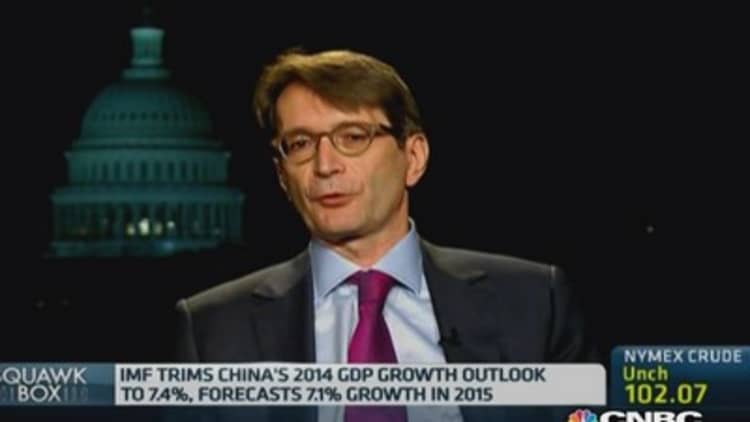The normalization of monetary policy in key advanced economies and a slowdown in emerging markets are two trends that pose sizable downside risks to the global economy, the International Monetary Fund (IMF) warned.
While advanced economies like the U.S. and the U.K. are recovering, emerging markets are "slowing on a broad basis," carrying "new spillover risks," the IMF wrote in its 2014 Spillover Report published on Tuesday.
"The interaction between sharply tightening financial conditions and a structural slowdown in emerging market economies would be damaging for the global economy," the fund said, adding that spillovers from these two trends combined have the potential to lower global output by as much as 2 percent.
Read MoreIMF cuts global growth outlook as US recovery falters
The annual Spillover Report was created after the financial crisis to improve the understanding of how vulnerability in one region could weigh on the rest of the world economy.

The extent of spillover risks related to unwinding of exceptional monetary stimulus will depend on whether it's being motivated by higher growth or otherwise.
"If the tightening of monetary conditions is not driven by higher growth but is instead triggered by, for example, financial stability concerns, spillovers could have a negative impact on growth elsewhere, especially in vulnerable emerging economies," the fund said.
Moreover, as monetary policy in major central banks move in separate directions – tightening in developed nations and easing in developing economies – volatility in currency could result, causing problems for economies with balance sheet vulnerabilities and foreign exchange exposures, it said.
Read MoreThe top market risk this summer is...
Investors already had a taste of potential spillover effects during the so-called taper tantrum, which began in May last year when the Fed first floated the possibility of winding down its monthly asset purchase program, roiling emerging markets as a result.
EM concerns
A protracted slowdown in emerging markets also risks global spillover through trade and finance channels, the fund said.
Last week, the IMF downgraded its overall growth outlook for emerging markets to 4.6 percent, from an earlier 4.8 percent, and down from 4.7 percent in 2013.
"Two features stand out when comparing the current slowdown with other such episodes: medium - term forecasts have been revised down continuously since 2010, and a slowdown in productivity is more visible this time around," the fund said. "The slowdown thus appears to have a large structural component."
Read MoreIMF sees no brutal slowdown in China
The report estimates that a 1 percentage point slowdown in emerging economies lowers growth in advanced economies by ¼ percentage point, on average, largely through reduced trade.
Managing spillovers
In order to mitigate potential spillovers from monetary policy normalization, well-crafted central bank communication would be key, the IMF said.
Meanwhile, emerging markets need to strengthen their focus in carrying out structural reforms to lift constraints on medium-term growth.
"While national priorities differ, common threads include addressing infrastructure need, particularly in electricity and transportation; improving education and addressing skills shortages; and enhancing competition and improving the business climate," the IMF said.


